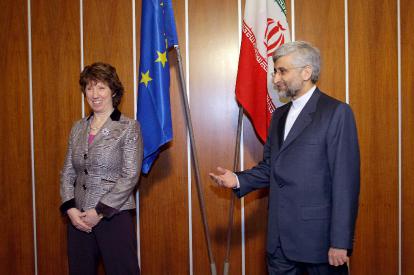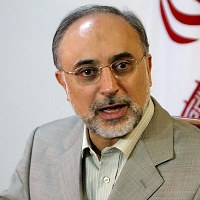![]()
Sun, Jan 30, 2011 | The Meir Amit Intelligence and Terrorism Information Center

Iran's chief negotiator Saeed Jalili (R) gestures next to EU foreign policy chief Catherine Ashton. (Geneva; AFP photo)
Reactions in Iranian Media to Failure of Istanbul Nuclear Talks
Iranian media blamed the West for the failure of the nuclear talks between Iran and G5+1 in Istanbul last weekend. Tehran Emrooz, a daily affiliated with the pragmatic conservative bloc, claimed earlier this week that foreign policy chief Ashton’s disappointment with the talks stemmed from the fact that the West was unable to force Iran to comply with its demands. She will remain disappointed, the daily argued, as long as the West continues its attempts to impose its will on Iran.
Iran’s negotiating stance is clear and obvious, says an editorial published by the daily. First, it will not negotiate its legitimate right to nuclear technology. Second, it is willing to act in accordance with international obligations, provided that the measures designed to ensure that its nuclear program is used for civilian purposes only are not limited to Iran and are also applied to other countries, including Israel. Third, Iran demands that the process of nuclear demilitarization include all the countries in the world. The West is obviously unwilling to accept such reasonable demands, making it responsible for the failure of the talks (Tehran Emrooz, January 23).
The conservative daily Siyasat-e Rooz also addressed the West’s disappointment with the talks, claiming that it was the result of Western countries’ inflexibility over Iran’s demands, including the nuclear demilitarization of Israel and the lifting of the sanctions illegally imposed on Iran. If Iran was willing to suspend its uranium enrichment, did not bring up the issue of the missiles in Israel’s possession, did not demand a discussion of Israel’s military nuclear program, and did not insist on having peaceful nuclear technology, the West would not be disappointed. Even then, however, Western countries would be unwilling to agree to Iran’s demands, because the West did not meet its obligations towards Iran even when it did suspend its uranium enrichment. The West should be disappointed, the daily claimed, because Iran is not willing to agree to all its demands and will continue insisting on its nuclear rights (Siyasat-e Rooz, January 23).
The conservative daily Resalat also laid the blame at the West’s door, claiming that the U.S. and Britain refused to give up on the idea of pressure-based diplomacy towards Iran despite their defeat in Iraq and Afghanistan and despite President Obama’s defeat in the congress elections. They are not willing to acknowledge that Iran’s nuclear program is past the point of no return. The members of the nuclear club have no other choice but to come to terms with the reality of a nuclear Iran; their political extremism, however, prevents them from doing so.
The Iranian delegation’s refusal to negotiate the nuclear rights of the Iranian people angered Western countries, which found themselves face-to-face with a different Iran from the one they had known and which they had always treated as the party to blame. Western countries are not interested in reaching an agreement with Iran, but rather continue employing a diplomacy based on exerting pressure. Iran’s official withdrawal from any discussion concerning the nuclear issue was declared in Istanbul, the daily said. In the future, that issue will either be relegated to the bottom of the list in negotiations with the West, or will be discussed by the professional and legal committees of the IAEA. The West is facing a new phenomenon called Iran, and that reality is difficult to accept even for China and Russia, which are used to the model of North Korea, a country that is unable to make any decision without consulting with them first (Resalat, January 24).
A different approach towards the Istanbul talks could be seen in an interview given by Javid Ghorban-Oghli, formerly a senior official in Iran’s Foreign Ministry, to the website Iranian Diplomacy, which usually presents a pragmatic view of foreign policy issues.
Ghorban-Oghli, the former chief of the Foreign Ministry African Affairs Department during the term of reformist president Mohammad Khatami, criticized the way the Iranian team (led by Saeed Jalili) handled the negotiations.
According to Ghorban-Oghli, the failure of the talks resulted from the lack of a clearly-defined framework for conducting the negotiations. While Western countries came to Istanbul to negotiate on the nuclear issue, the Iranian delegation came to the negotiating table to gain recognition of Iran’s right to enrich uranium and lift the sanctions imposed on it. The former diplomat claimed that Jalili failed to properly realize the meaning of his diplomatic mission. As chief negotiator, he is supposed to find ways to solve the nuclear problem, not the problems of the whole world. Bringing up the Iranian suggestions, he said, only exacerbated the crisis and worsened the sanctions imposed on Iran, while doing nothing to ease Western concerns over Iran’s nuclear activity.
Ghorban-Oghli said that the nuclear issue must be handled separately from all the other problems in the world worth handling. When oil was nationalized in the early ‘50s, former PM Mohammad Mossadegh focused on the main issue, which was the nationalization of oil rather than the unjust world order that prevailed at the time. The talks between Iran and the G5+1 are not the appropriate venue to discuss issues of global reach. If Iran is interested in discussing such issues, it would be advised to do so in other contexts, such as the UN General Assembly or the organization of Islamic countries, where it can enjoy the support of many other countries.
The former Foreign Ministry official also brought up questions about the Iranian delegation’s refusal to hold direct talks with the representatives sent by the U.S. to the Istanbul talks. He mentioned that last year Iran had agreed to hold talks with William Burns, the U.S. representative to the Geneva talks. The reason for the Iranian delegation’s refusal to hold direct talks with U.S. representatives this time is therefore unclear. Iran must use all means it has at its disposal to solve the nuclear issue, including direct talks with U.S. representatives. Ghorban-Oghli warned that if the talks fail, the pressure and sanctions on Iran will escalate (Diplomasi-ye Irani, January 24).



 RSS
RSS










Reactions in Iranian Media to Failure of #Istanbul #Nuclear #Talks | #Iran #EU #US #Turkey #Russia #China #UK http://j.mp/eTm0IQ